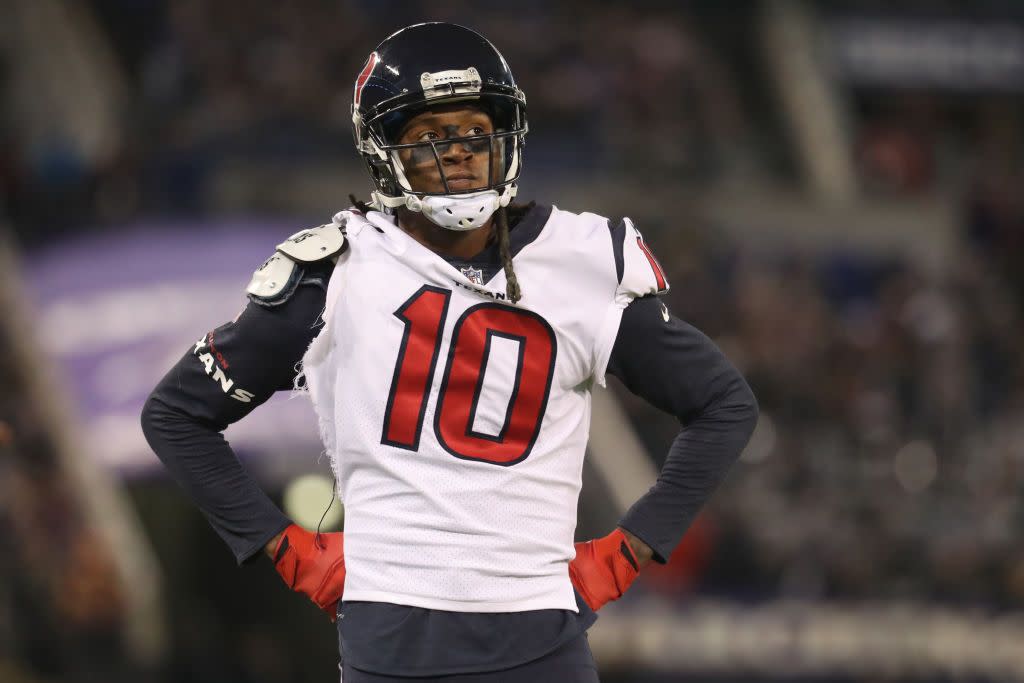DeAndre Hopkins: Trump is 'closed-minded' on anthem issue

Houston Texans wide receiver DeAndre Hopkins had some pointed words for the president regarding the once-and-future controversy over protests during the national anthem.
Caught at Los Angeles International Airport in one of those TMZ on-camera ambush interviews, Hopkins held forth on the state of protests, suggesting that we’re nowhere near the end. “I think Trump is more closed-minded and he thinks the reason that we’re kneeling is because of the flag,” he said. “When that’s, like, not at all the reason we’re kneeling.”
The anthem controversy has ground forward a few yards since last season. Let’s recap.
The players’ perspective
The NFL protests began with former San Francisco 49ers quarterback Colin Kaepernick, who began kneeling during the 2016 preseason to protest systemic racism and police brutality. A few players joined him, but in an election year, Kaepernick’s stance didn’t draw as much attention as it otherwise might. But when Kaepernick, still clearly in possession of NFL-level skills, went unsigned after the 2016 season, eyebrows raised.
A few players protested in sympathy with Kaepernick’s plight early in the 2017 season, but then Trump sent the issue into orbit when he thundered against kneeling players at a September 2017 rally in Alabama. Hundreds of players knelt after that, taking issue with the president disregarding their concerns and calling anyone who knelt a “son of a bitch.”
The Houston Texans saw matters grow even more hostile; after the revelation that Texans owner Bob McNair had compared the players to inmates, the team protested en masse. But none of the protests were directed at the American flag or the idea of America itself, the players noted on multiple occasions, despite opponents’ attempts to portray them as unpatriotic.
“I kneeled last year and one of my best friends is a Purple Heart veteran and my uncle is a Purple Heart veteran and they understand that it’s not about the flag,” Hopkins said. “But, when a general person like that makes it look like, ‘Alright, they’re doing this because of the flag,’ then of course his followers are going to think the same. But, that’s not the case at all, you know?”
Many NFL fans took the protest as disrespectful because of its timing, and suggested that the players were being unpatriotic by protesting during the anthem. Even though the protests were silent, unobtrusive, and the very essence of patriotism — the right to speak one’s mind, regardless of location or paycheck, is a bedrock American freedom — opponents of the protests nonetheless seized on the idea that the protests were in some way disrespectful, and the president seized on and amplified those charges.
Trump’s pardon offer
Early in June, Trump offered up an unexpected positive statement on the anthem saga, offering to consider pardons for names the players suggested. “I’m going to ask all of those people to recommend to me — because that’s what they’re protesting — people that they think were unfairly treated by the justice system,” he said at the time. “And I understand that. I’m going to ask them to recommend to me people that were unfairly treated and I’m going to take a look at those applications and if I find and my committee finds that they’ve been unfairly treated than we’ll pardon them. Or at least let them out.”
Trump has not since offered any public updates or clarifications of his stance on pardons.
The players’ response
Shortly after the president made his pardon offer, several players penned an editorial in the New York Times explaining both the players’ position and the specific steps the president could take to help, starting with reducing the number of inmates imprisoned for nonviolent or drug-related offenses.
However, the players cautioned that this is not an issue that can be solved with a few quick pardons: “[A] handful of pardons will not address the sort of systemic injustice that NFL players have been protesting,” they wrote. “These are problems that our government has created, many of which occur at the local level. If President Trump thinks he can end these injustices if we deliver him a few names, he hasn’t been listening to us.”
What’s next?
For the president, the opportunity awaits to prove that he is serious about his pardon offer, and that he’s not “closed-minded,” in Hopkins’ words, about the anthem issue. For the players, the question of whether to protest remains open, given that the NFL will require players to stand for the anthem or wait in the locker room. Regardless, the underlying issues aren’t going away, and neither is the criticism of the protesting players.
____
Jay Busbee is a writer for Yahoo Sports. Contact him at jay.busbee@yahoo.com or find him on Twitter or on Facebook.
